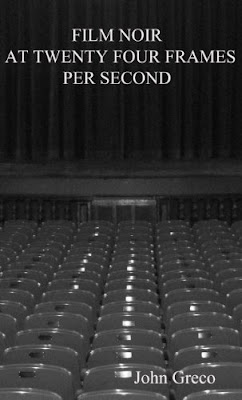My Classic Movie Blog Association colleague John Greco—in addition to being a writer and photographer—is not an individual content with letting grass grow under his feet. He’s the author of two Kindle books on classic films including his latest, Lessons in the Dark, and a mystery entitled Murder with a Twist. In addition to contributing to two e-books of past CMBA blogathon essays—Words, Words, Words! and Planes, Trains and Automobiles—he owns and operates three blogs including a personal one and one devoted to his photography, watching shadows on the walls. (Me? I’m lucky I was able to get back into the blogging game without taking time out for a nap.)
Twenty Four Frames is
the title of John’s classic movie blog, and an e-book containing essays from
that site, Film
Noir at Twenty Four Frames Per Second, was published in 2014; the price
was right ($2.99) and the topic of the articles within is my particular classic
movie meat, as you probably well know.
There are twenty-one in all, covering a lot of familiar “Dark City”
territory: Night and the City, Ace in the Hole, Kansas City Confidential, etc.
There’s even a nod to neo-noir with a piece on the 1990 film After Dark, My Sweet.
What I enjoyed most about John’s book is that much of its
content covers those films that sometimes get skipped over as film fans are feverishly
leafing through the Noir Encyclopedia.
One in particular is Night Editor
(1946), which has its antecedents in old-time radio (it aired on various
networks and various coasts from 1934 to 1948).
It’s a “bargain basement” effort from Columbia that does feature a
laudatory performance from actress Janis Carter—who, according to John, is a “nasty,
treacherous, cold hearted man-eater” bringing nothing but bad news for the
movie’s hero, luckless William Gargan. I
also read about this movie in a book that will be reviewed on the blog in this
space next week, and since it’s available for purchase on the Sony Home Video
release Bad Girls of Film Noir, Volume 2 it’s going to be one I track
down at the first available opportunity.
John brings new insights to lesser noirs like Roadblock (1951) and Crashout (1955), and like so many of us
classic movie nuts, received his education growing up watching old movies on TV
(he hails from Brooklyn, and received essential exposure to WNEW’s Channel 5 as
a youngster). He was most taken with The Maltese Falcon (1941), and kudos to
him. “The world of noir evoked a shadowy
universe of danger and violence crammed with duplicitous women and dangerous
men,” Greco writes in the introduction. “It
didn’t matter what side of the law they were on, and sometimes it was hard to
tell.”
Greco’s background in photography is a major plus when
appreciating the stylized cinematography that’s the hallmark of good noir
movies, and John’s prose is lean, mean, and to the point—no need for lacey artifice
here. To me, the best thing a critic can
bring to the table is to make you want to seek out films you haven’t crossed
off your list yet…and on the off-chance you have
seen it, instill in the reader a new appreciation for the movie—or better
still, tempt them into sitting down with it again.
“So, grab a bottle of the hard stuff and settle down in a
comfortable chair,” invites John seconds before the first review, the Poverty
Row classic Detour (1945),
commences. (I’m already in Count von
Comfy Chair, but the hard stuff will have to be Crystal Light Fruit
Punch.) “It’s going to be a perilous
journey down those darkly lit mean streets.”
You can’t beat the price, and I think you’ll enjoy what is undeniably a
brisk, efficient read.





Ivan,
ReplyDeleteThanks for the great review! Including some lesser known noirs was certainly in hopes that folks would seek them out. As you well know, there is so much out there, small films, almost forgotten works that are worth watching. Thanks again!
Great review. John's blog and books are a great asset to the classic film blogging community. I also admire his "lean, mean and to the point" prose.
ReplyDeleteJohn Greco writes a must read site for all movie fans and especially the classic Film noirs. Jay Kanter
ReplyDelete